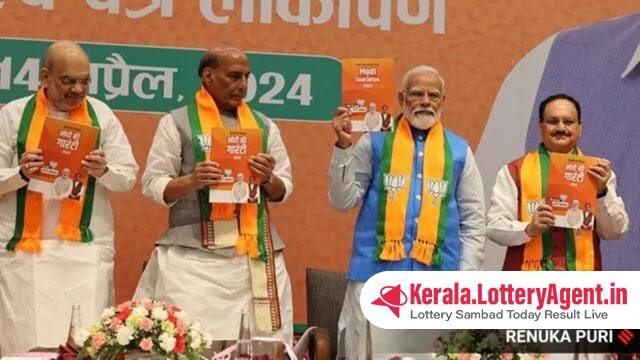
Setting a towering economic goal in its recently unveiled election manifesto, the Bharatiya Janata Party (BJP) promises a wave of “next generation of reforms” designed to catapult India into the position of the world’s third-largest economy. The document, titled ‘Modi ki Guarantee 2024,’ released on a Sunday, outlines an ambitious roadmap infused with strategies for spurring growth and combating poverty through further fiscal caution, infrastructural improvements, and a broad range of credit expansion initiatives – including the promise to double the cap on Mudra loans.
At the core of the manifesto is an optimistically framed guarantee. BJP asserts upon a national progression under its governance that witness India rising to the economy ranking above its current fifth place, envisioning a ‘Viksit Bharat’ or Developed India by the nation’s centenary year, 2047. “Bharat will be the 3rd largest economic power,” the manifesto confirms, signaling a determination to surmount the accomplishments of the past decade.
Infrastructure plays a pivotal role in this envisioned leap forward, with commitments to enhancing road networks, railways, and metro links utilizing next-generation train technologies. Moreover, the party seeks to address the global shift toward sustainable transportation through the development of comprehensive electric vehicle (EV) charging infrastructure while also expanding aviation facilities and advancing telecommunications with affordable 5G and pioneering 6G networks.
Financial measures feature prominently, with BJP maintaining a narrative of economic stability marked by low inflation and high growth over the past ten years. The party, anticipating another term in power, sets its sights on a fiscal deficit at 5.1% of GDP for FY 2024-25, methodically to be curtailed to 4.5% by FY 2026. The manifesto details intentions to boost manufacturing, services, rural industry, and credit – vital cogs expected to generate employment and foster both jobs and self-employment opportunities.
Underpinning this industrial vision are existing programs such as the Production Linked Incentive (PLI) scheme and the Make in India initiative, which have already bolstered manufacturing. BJP’s strategy revolves around streamlining regulatory processes, enhancing infrastructure investments, channeling capital into various industries, and promoting research and development. These are set to unfurl within prioritized sectors including defense, rail, automobile, aviation, semiconductors and chip manufacturing, and shipbuilding.
Startups are another segment receiving due attention. Efforts such as Atal Tinkering Labs, Hackathon, Startup India, and the Start Up India Seed Fund Scheme are highlighted within the manifesto as strides toward a robust startup ecosystem. The connection between education and enterprise is targeted through a collaborative network of incubators wed to higher education institutions. This, the party hopes, will nurture a spirit of entrepreneurship among the student population and will be supported by an expansion of the existing Startup India Seed Fund Scheme and Startup Credit Guarantee Scheme, ensuring startups possess the requisite financial backing to thrive.
Moreover, the manifesto pledges to augment credit access for small businesses longing to scale up. Touting its PM Mudra scheme, initiated in 2015, which dispenses collateral-free loans to non-corporate micro-entrepreneurs, BJP aspires to double the loan limit from Rs 10 lakh to Rs 20 lakh, building on the over 46 crore loans handed out thus far under the scheme. Other supportive measures like PM Svanidhi and PM Vishwakaram Yojana, alongside the aforementioned Mudra scheme, promise to create “livelihood opportunities for all families,” encompassing the OBC, SC, and ST communities.
For traders and micro, small, and medium enterprises (MSMEs), the manifesto pledges to simplify the GST portal and work alongside state governments to ease legislative bottlenecks that inhibit business. In line with these simplification endeavors, the party has indicated its commitment to a sweeping reform of economic and commercial legislation, reflected in the recently passed Jan Vishwas (Amendment of Provisions) Act, 2023, which saw the decriminalization of numerous provisions under various central acts.
Lastly, the manifesto does not overlook the often marginalized segment of gig workers. It promises to ensure the periodic revision of national floor wages and vows to strengthen social security schemes through integration with post office and Digital India networks. The e-Shram portal will play an integral part in extending welfare schemes to gig workers, migrants, and transportation providers, solidifying their place within India’s labor fabric.
This ambitious framework, outlined by BJP, not only envisions an economically resurgent India but also seeks to permeate growth across various strata of society, embedding technological advancement, employment growth, and social security within the fabric of national development.












